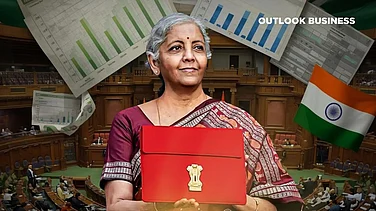The Indian stock market’s reaction to the Interim Budget 2024 announcements remained muted. Markets witnessed higher volatility after the budget presentation. Initially, the 30-share BSE Sensex fell around 140 points to 71,612.74, while the NSE Nifty fell 33.15 points lower at 21,692.55. However, both the indices witnessed some recovery later in the session.
Finance Minister Nirmala Sitharaman presented her sixth budget and the last one of the Prime Minister Narendra Modi-led government’s second term. The budget emphasized on fiscal consolidation, infrastructure, agriculture, green growth, and railways. However, no changes were made to the tax slabs.
According to market experts, the budget contained minimum surprises and reflected the government’s commitment to fiscal consolidation. The markets choose to remain focused on the ongoing Q3 earnings season and global development for stock-specific performance. However, positive momentum was seen in the FMCG stocks due to initiatives aimed at increasing disposable income among the middle class. On the other hand, railway stocks witnessed a decline amid concerns over the implementation and impact of announced projects.
KVS Manian, Whole-time Director at Kotak Mahindra Bank said, "The aim to bring the fiscal deficit down to 5.1 per cent of GDP for FY25 is lower than general expectations of 5.2-5.4 per cent and that is very heartening. The minister is showing strong intentions, ahead of the election year, to adhere to the fiscal consolidation path will be well received by rating agencies as well as the global investors that are eyeing India as an attractive investment destination."
Motilal Oswal, Managing Director and CEO of Motilal Oswal Group said, “The government’s commitment to a 4.5 per cent Fiscal Deficit by FY26 is indeed commendable. Towards that effect, it has penciled in a fiscal deficit of 5.1% for FY25, better than most economists' estimates. This augurs well for overall economic credit creation as indeed for inflation and private capex revival”.
The 17 per cent increase in Capital Expenditure allocation on the back of a 3x increase over FY19-24 (from INR 3 trillion to INR 9.5 Trillion) indicates the continued thrust of the government towards infrastructure creation and driving the private investment cycle.
“What is a bit of a dampener, however, is the lack of any big push for consumption. Consumption has been weak, especially in Rural India, as indicated by corporate earnings for last few quarters. The budget doesn’t provide any near-term solution for quick revival for consumption,” Oswal said.
“The budget allocation for sectors such as infrastructure, healthcare, technology, and renewable energy indicates a strategic focus on sustainable development and digital transformation. For instance, the emphasis on affordable housing and infrastructure development will likely spur growth in the construction, real estate, and related manufacturing sectors (cement, steel),” said Sonam Srivastava, Founder and Fund Manager at Wright Research, PMS.
“The allocation towards healthcare and technology suggests an acceleration in digital health initiatives and tech-driven innovation, opening up new avenues for businesses in these sectors,” she added.
Railway-related stocks such as IRFC, Rail Vikas Nigam, Railtel, Titagarh Rail Systems, and others witnessed a decline up to 2 per cent after FM Sitharaman’s interim budget speech in the Lok Sabha on Thursday.
In the budget, the government allocated a capital expenditure (capex) of Rs 2.55 lakh crore for the Indian Railways, marginally higher than the Rs 2.4 lakh crore announced in the previous year’s budget.
FM Sitharaman announced three major economic railway corridor programs identified under PM Gati Shakti to be implemented to improve logistics efficiency and reduce costs. In addition, 40,000 rail bogies will be converted to Vande Bharat Standards.
“Announcements on Rail infra spend and 11.1 per cent rise in overall capex would be in line with most expectations. All in all, we think the impact of the interim Budget on equity markets will be neutral to mildly positive for the near term and other emerging triggers will drive its trajectory later,” said Dhiraj Relli, MD & CEO at HDFC Securities.
Banking stocks witnessed a surge as the government’s fiscal deficit target of 5.1 per cent and net borrowing of Rs 11.75 lakh crore for FY25 has boosted optimism around banks. PSU Bank stocks including State Bank of India, PNB, Bank of India, Punjab & Sind Bank, UCO Bank, and Canara Bank surged up to 3 per cent after the budget.
The Finance Minister announced that the Centre is close to achieving its target of 3 crore houses in rural areas despite the impact of the Covid-19 pandemic. Additionally, the government has set a new target to build 2 crore more houses in the next five years under the Pradhan Mantri Aawas Yojana (PMAY Grameen).
“This significant announcement is poised to impact stocks in the steel, cement, and power sectors positively, especially with the augmented budget allocation,” said Sanjay Moorjani, Research Analyst at SAMCO Securities.
Overall, the market's muted reaction shows cautious optimism, with investors closely watching the implementation of budget measures and their tangible impacts on various sectors. Sectors benefiting from direct budget allocations or policy support may see positive momentum, while others may face challenges if perceived to be negatively impacted or overlooked by the budget.




























